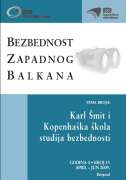Shvatanje transnacionalnog organizovanog kriminala kao bezbednosne pretnje i teorije bezbednosti
Understanding Transnational Organized Crime As A Security Threat And Security Theories
Author(s): Saša ĐorđevićSubject(s): Politics / Political Sciences
Published by: BCBP Beogradski centar za bezbednosnu politiku
Keywords:
Summary/Abstract: Transnational organized crime can be explained as a phenomenon that jeopardizes a country’s identity, which includes its form of government, its policies and the way it is perceived by other states in the sphere of international relations. After the end of the Cold War and under the influence of new social trends, transnational organized crime has more than ever come to present a serious security threat. It is in this period that the concept of “security” emerges in security studies. No longer understood solely in the “manner” of realism, security is understood at a different, one could say higher level. In addition to the state, society is also perceived as a reference object of security. This is what gives rise to the discussion of the notion of transnational organized crime as a security threat to a state. This work will discuss the perception of transnational crime, as well as the securitization of the abovementioned phenomenon. When defining transnational organized crime, we will use the United Nations Convention against Organized Crime.
Journal: Bezbednost Zapadnog Balkana
- Issue Year: 2009
- Issue No: 13
- Page Range: 39-52
- Page Count: 14
- Language: Serbian

